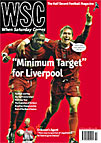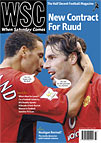 Somehow football and rap have rarely hit it off, in spite of some peciliar parallels in the fashion stakes. Al Needham works hard to find what references there are to the game
Somehow football and rap have rarely hit it off, in spite of some peciliar parallels in the fashion stakes. Al Needham works hard to find what references there are to the game
First, a word of reassurance: just because footballers seem to be getting into hip-hop a good 15 years after everyone else did does not compromise in any way the well loved cliche about footballers having bland and rubbishy musical taste. Ever since hip-hop overtook country and rock to become the most lucrative genre of music in America, it has been successfully defanged of its subversive elements, until what Chuck D of Public Enemy called “the Black CNN” is now some bloke prattling on about what he bought the other day, who he’d like to shoot and generally how ace he is. Again. For 50 Cent, Eminem and Jay-Z, read “George Benson, Shakatak and Steak and Chips”.
Read more…
 Yuriko Saeki became only the second woman to manage a Western European men's professional team. Luke Gosset talks to the Japenese coach – briefly manager – of Spanish lower division side Puerta Bonita
Yuriko Saeki became only the second woman to manage a Western European men's professional team. Luke Gosset talks to the Japenese coach – briefly manager – of Spanish lower division side Puerta Bonita